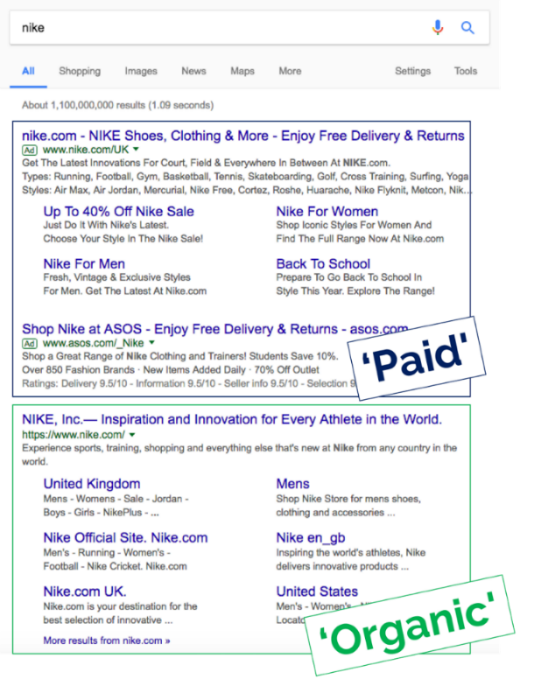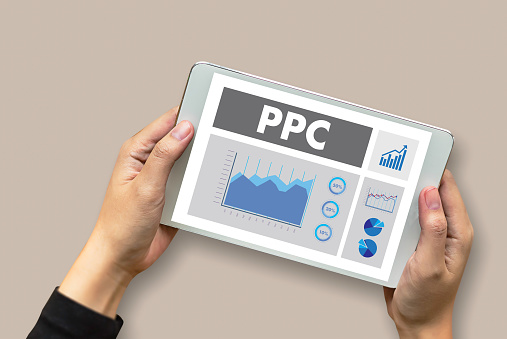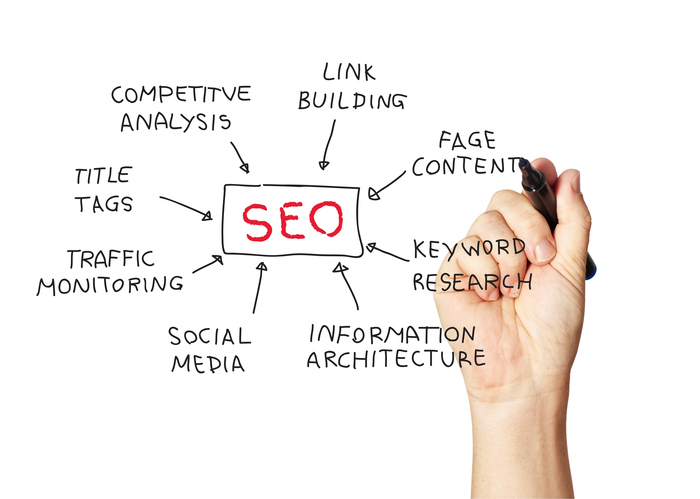The beginner's guide to PPC & SEO: expert tips for business owners
4 October 2017
Investing in digital marketing is a no-brainer for your business. It will help you increase your online visibility, and in turn, increase your web traffic and sales. Arguably, the most effective type of digital marketing is being listed in online searches, with PPC and SEO as the main routes to choose. Peter Marshall, Chief Marketing Officer at Add People, shares his tips for business owners.
What's the difference
SEO or Search Engine Optimisation is all about optimising your website to be seen by search engines, like Google, when people are searching for your product or service (also known as ‘organic search’).
Whereas PPC or Pay-Per-Click is where you pay to get your website seen on search listings (also known as ‘paid search’). The most widely used PPC platform is Google AdWords, which relies on the idea of bidding for advertising space on the first pages of Google searches. You bid against competition on specific keywords and phrases that represent what searches you want your business to show for.
How do they work?
SEO and PPC differ in not only costs but also in their position on search results and in their traffic potential. Organic search is often considered more beneficial for these reasons, as it brings you traffic without any recurring costs – however, the process takes time.
Your SEO efforts may not be seen straight away, but they provide you with solid long-term benefits and once your website is at the top of organic Google results, you’ll notice the difference! According to Neil Patel, co-founder of Crazy Egg, the first five results in Google get 67% of all clicks.
PPC, on the other hand, provides you with an ad that can be seen on the first page of search listings almost instantly with the right keyword choice and bidding strategy. Pay-Per-Click offers a sound start to any digital marketing strategy with its instant demand capture and it is particularly useful for getting SMEs off the ground. It can quickly get ads up on the first page of search listings, offering short-term gains that could not otherwise be achieved. With the ability to instantly target and capture your audience’s demand, you can quickly get a cost-effective yet steady stream of new business coming through the door.

A combined strategy is greater than the sum of its parts
SEO and PPC work even better hand-in-hand – it shouldn’t be a case of ‘either or’. By using both, you maximise not only the amount of traffic and sales opportunities available to you but also the amount of useful information you can squeeze out of each campaign. Both your SEO and PPC campaigns will give you information about keywords and your customers, including their behaviour, intentions, locations and so on. This information can be taken and used within a combined strategy. For example, you can test out your keyword strategy in your PPC campaign to make sure you’re getting it right with your longer-term SEO strategy.

PPC best practices for quick wins
Sticking to best practices in your PPC campaign is essential if you want to achieve good results. You need to think about everything from the small ad that comes up in the search engines through to the page that the ad takes people to (the ‘landing page’). Here are a few things to consider for your Pay-Per-Click marketing strategy:
- Content: All your PPC content needs to be relevant to the keywords you are bidding on, but also relevant to the audience you are aiming it at. Not only do you have to speak the same language through your writing style and tone, you have to know what will persuade them to find out more. Think about how to engage them to get you those conversions.
- Ad extensions: By using ad extensions, you can fit more information into your ad, giving more reasons for customers to click on it and find themselves on your site. They give you a chance to boost your search results and the perceived value of your website.
- Imagery: Your PPC landing page has to include quality imagery to match the quality content that targets your audience. Imagery will help them to connect with your message and what you are selling. Also, make sure all images are compressed on upload so they don’t affect your page speed.
- Trust signals: Selling is all about persuasion, and you need to prove your worth as a business. Gain your visitors’ trust with testimonials and reviews or social media followers and likes. There are a number of ways to give your potential customers the reassurance they need to click ‘Add to cart’ or book your services.
- Call to action: On your landing page, there should be a clear call to action (CTA). You want to make it as easy as possible for the customer to purchase your product or service. Make sure you include your contact information or CTA buttons pointing to the desired action you want your customers to take.
- Mobile-friendly: Optimisation for mobile devices isn’t just a matter of PPC. It’s something that your whole website should take on. Phones and tablets have become one of the main devices for online search so it’s important your site adapts to ensure ease-of-browsing. A bad user experience will only lead to potential customers leaving your website with nothing.
- Testing: Test it and test it again. Over time, you should change and optimise your PPC campaign, making the most of the data you get to ensure optimum engagement with your customers.
- Resources: Google and its Partners offer a suite of free online training for AdWords. Crawl through the AdWords help centre to make sure you’re up to speed with the world’s leading PPC platform.
SEO best practices for sustained growth
Whilst it might take its time to kick in, you should still implement SEO best practices on every page of your site as soon as possible to get it going. It will increase your chances of being listed on the first few pages of Google over time. Here are the main things you have to consider:
- Content: Google wants quality, useful and unique content. For example, your search positions will be negatively affected for duplicate content on your pages. You need to optimise your content to ensure it pays off. This is where your title tags, header tags, and meta descriptions come into it.
- Keywords: Next up – and this is a big one – is keywords. Keyword research and keyword usage in your content are essential to boosting your rankings for your specific product or service. Here’s where you can use the effective keywords in your PPC campaign to inform your SEO strategy.
- Readability: The content not only needs to be engaging to read but also easy to read. This is helped by short sentences, short paragraphs, and text split up with bullet points and imagery where relevant.z
- Internal linking: By adding in useful internal links (links to another page on the same website) wherever you can, you will help boost the authority of your site.
- Imagery: Images are important to every page on every site, partly because it looks better and partly because it helps SEO. Just make sure you use appropriate ‘alt’ tags and filenames for your images, using your preferred keywords where you can, to make the images SEO-friendly.
- Responsive: We’ve already mentioned the importance of optimising your site to suit mobiles devices for PPC purposes, but it’s equally important for your SEO too. Don’t lose out on customers and conversions with this silly mistake. Google favours websites that a fully optimised for all devices.
- Tools and Resources: The web is full of tools and resources to help you evaluate and improve your SEO. Resources like Moz’s Learning Centre can advance your understanding of SEO, whilst tools like Screaming Frog SEO Spider can help you understand how exactly to get your website up to scratch.

The ultimate tip? Use experts...
Digital marketing might be easy to pick up, but it’s difficult to master. As a business owner, trying to juggle an effective marketing strategy along with the day-to-day running of your business could spread you too thin and limit your returns. Businesses that bring in qualified help or outsource effectively find that the experts can bring much higher returns on investment than their in-house efforts.
What should I look for in an agency?
If you do want to outsource, it’s important you choose the right digital marketing agency for you as they’ll be responsible for helping you transform your business online. You want a marketing agency that’s in it for the long-run and cares about getting you results, so make sure you quiz potential agencies to see if they’re a good fit for you.
What services do you offer?
You need to think about the direction you want your business to go in. Do your research and speak openly about where you see your business in the future. A good agency will be sure to offer some useful − and honest − advice. They will be able to tell you exactly what needs to be done and what they can do for you.
What prices should I expect?
Prices will vary from agency to agency, but one word of advice would be to be wary of those offering prices too good to be true. Why? Because often they are too good to be true. That’s not to say that there aren’t affordable options, though. Some agencies might be adding on extras that your business doesn’t need or they may not be being clear about how their pricing works. So, shop around and choose an agency that fits your budget.
Have you worked with any businesses that are similar to mine?
We understand that you won’t feel comfortable throwing money at something simply ‘in the hopes’ that you’ll get the results you want. Ask an agency about similar businesses or similar campaigns that they have worked on so you can make a comparison to the results you could achieve together. You’ll be able to find out more about the strategy they will use, and it will give you a good idea of how much time and money you should put into your digital marketing.
On top of finding out more about the agency’s success with similar clients and campaigns, it’s worthwhile checking out reviews. You can often find these on independent review websites like Trustpilot.
What’s your onboarding process?
It’s important for an agency to deliver a thorough onboarding process for their clients. It’s the best chance for the agency to fully understand your business and work out how best to advertise it. This way, the agency can get the best results for you from the outset and you can feel safe with your business in their hands.
What can you do to help your digital marketing agency?
It takes two to tango. In this perfect partnership, you need to be able to do all you can to help the agency help you. That means being available for phone calls, providing useful business information and content whilst cooperating on advertising campaigns.